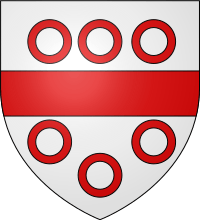Thomas Lucas (Royalist)
Sir Thomas Lucas (died 1649) of Lexden, Essex, England, along with his younger brothers, Sir John Lucas (d.1671) (in 1645 created Baron Lucas), and Sir Charles Lucas (d.1648), distinguished himself as an officer fighting for the royalist cause in the Civil War.[1][2]

Origins
Lucas was the eldest son of Sir Thomas Lucas (d. 1625) of St John's, Colchester, Essex, by his mistress and future wife Elizabeth Leighton, daughter of John Leighton of London, gentleman. He was illegitimate as he was born before his father's marriage with Elizabeth Leighton.[3] His brothers Sir John Lucas and Sir Charles Lucas also fought for the King. His younger sister Margaret Lucas, a prolific writer and a scientist, was the wife of the Duke of Newcastle.[4]
Career
His father purchased for him the manor of Lexden, Essex, from the heirs of Robert Ratcliffe, Earl of Sussex.[5]
Lucas obtained the command of an English troop in the Dutch service, and was knighted by Charles I on 14 April 1628.[6] In December 1638 Thomas Wentworth, 1st Earl of Strafford gave him the command of a troop in the Irish army.[7] He was one of the officers in whom Ormonde most confided during the Irish Rebellion of 1641, and held the rank of commissary-general of the horse. He distinguished himself at the Battle of Kilrush (15 April 1642), and was badly wounded at the Battle of New Ross on 18 March 1643.[8]
From 1642 Lucas was a member of the Irish Privy Council, took part in negotiating the cessation of hostilities in 1643 and the treaty of 1646, and was consequently held a delinquent by parliament.[9] He was, however, allowed to compound for his estate on paying a fine of £637 in 1648, and died before October 1649.[10]
Marriage
Lucas married Mary Byron, daughter of Sir John Byron of Newstead, Nottinghamshire.[11]
Notes
- Firth 1893, p. 231.
- Kemp 1964, p. 27.
- Firth 1893, p. 231 cites Morant, History of Essex, i. 124)
- Firth 1893, p. 229 see Margaret Cavendish, A True Relation of my Birth, Breeding, and Life Firth (ed), pp. 280-3).
- Firth 1893, p. 231 cites Morant, History of Essex i. 124. 131.
- Firth 1893, p. 231 cites Metcalfe. Book of Knights.
- Firth 1893, p. 231 cites Strafford, Letters, ii. 254, 262).
- Firth 1893, p. 231 cites Bellings, History of the Irish Catholic Confederation, i.132; Carte, Ormonde, ed. 1851. ii. 247, 252.
- Firth 1893, p. 231 cites Bellings, ii. 46, 365.
- Firth 1893, p. 231 cites Cal. of Compounders p. 675; Cal. of Co. for Advance of Money, p. 821.
- Firth 1893, p. 231 cites Collins, vii. 99.
References
- Kemp, AnnaBelle (1964). Lucas genealogy. Higginson Book Company. p. 27.CS1 maint: ref=harv (link)
- Attribution

- Lloyd's Memoirs of Excellent Personages, 1668, contains a Lives of the Lucases
- Heath's New Book of Loyal English Martyrs contains a Lives of the Lucases
- Morant's History of Colchester, 1789
- Morant's History of Essex, 1758